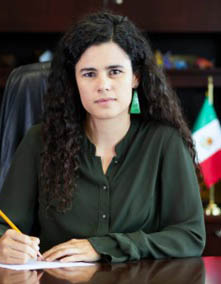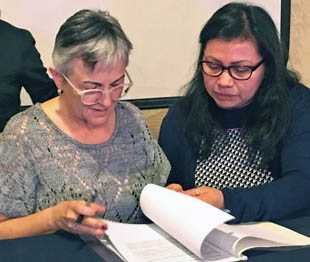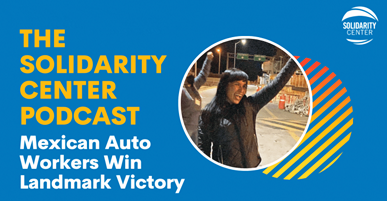|
|
|
|
The weekly newsletter of the México Solidarity Project |
|
|
|
Every issue archived online at mexicosolidarityproject.org |
|
October 19, 2022/ This week’s issue/ Meizhu Lui, for the editorial team |
|
|
US Aid to Méxican Labor: Beware or Be Happy? |
|
Sometimes it seems to me that the “free” in “freedom” refers to all the ads I see for allegedly “free” things. Buy one get one free, free for the first 30 days, interest-free loans, and so on. Yes, I’ve fallen for these come-ons — when I haven’t examined the fine print — and I’ve paid the price. The high price. I’ve experienced “free-dumb.”
“Free” offers, let’s not forget, also proliferate on the international political scene, and we ought to be just as suspicious of them. So the hairs on the back of my neck went up a while back, during the Trump administration no less, when I heard the US government was going to be giving $180 million to help México implement reforms that would benefit Mexican workers. Must be a catch, I felt, conditions, quid pro quos!
Did I have just cause for that suspicion? We have no better person to answer that question than our interviewee this week, Kim Nolan, a key figure in the US Department of Labor’s International Bureau of Labor Affairs, the folks now dispensing that $180 million.
My cloud of suspicion had actually already begun to lift last year when Thea Lee became the Labor Department’s deputy undersecretary for international affairs, the Bureau’s top official. Lee, a veteran progressive economist and not a political careerist, has earned respect over a long career as a hard-hitting and honest advocate for labor.
We’ll continue, in our weekly newsletters, to cover and expose US government moves that undercut justice and progress in relations between the United States and México. But let’s allow ourselves this week a moment to appreciate that our two nations, through the work of people like Thea and Kim, can cooperate to create the systems and structures necessary to underpin democratic reforms. We’ll remain skeptical, like AMLO, of “free” offers. We’ll also salute deals that bring win-wins for both giver and receiver. |
|
|
|
Don’t miss an issue. Subscribe to our weekly México Solidarity Bulletin! |
|
|
|
|
Hand in Hand: US and Mexican Labor Officials |
|
Kim Nolan is currently working as the monitoring and enforcement team leader for the US Bureau of International Labor Affairs oversight of the two-year-old United States-Mexico-Canada Agreement, the USMCA. Nolan had previously held public university academic posts in México City for more than a decade, at the Centre for Research and Teaching in Economics and at the Latin American Faculty for the Social Sciences program for human rights and democracy. Her research has focused on international trade, and she’s published extensively on labor protections in trade accords, the role of civil society actors in testing those provisions, and the outcomes for worker rights. She’s also done research for labor-based civil society organizations in the US, Canada, and México. |
|
|
How did you get involved in Mexican labor issues?
I’m a child of the anti-NAFTA protests that began with the Zapatista uprising in 1994. I wasn’t even in college yet. What hit me the most: that US corporations could move into México and treat workers in ways that would be illegal in the US.
Then, in 1997, I participated with Liberation Theology activists on a trip across the border and stayed with a family working in a maquiladora. I witnessed the direct effects of NAFTA on Mexican families and workers.
Unfortunately, the strong international solidarity we saw back in the 1990s has been “unbuilt” since then. We’ve got work to do to build that solidarity up again.
Congress, after the USMCA’s passing, appropriated a whopping $180 million to help Mexico with labor rights reform. This went through with a Republican in the White House! How?
Back in the 2016 campaign, Trump had in common with the AFL-CIO a concern that US workers be able to compete fairly with Mexican workers. The chance to renegotiate NAFTA and address those concerns through a new agreement’s labor chapters had to come with money for implementation.
USMCA funding for technical assistance channels through the US Labor Department’s Bureau of International Labor Affairs, to be spent over the next five years on programs that support labor reform implementation. We expect that México will remain a key country for Department of Labor engagement. The Bureau has had its eyes on México for at least 20 years, through both Democratic and Republican administrations. Our course won’t reverse. |
|
Does the technical assistance come with strings attached?
No. We see this as a collaborative effort with our Mexican counterparts, not a matter of México “cooperating” with something the US is imposing. We’re helping to implement the changes demanded by the democratic union movement in México over many years. México’s current Secretariat of Labor and Social Welfare has roots in that movement, especially through the FAT, the Frente Autentico del Trabajo. Other key Mexican labor ministry officials also have come from the FAT.
México set up a new and impartial Federal Center for Labor Conciliation and Registry, responsible for registering new unions and new contracts, in 2020. México then also established new labor courts independent of the PRI political party, employers, and the discredited CTM labor federation. Does the US Bureau of International Labor Affairs get involved in this Federal Center work? |
|
|
Luisa Maria Alcalde Lujan, |
|
Mexican workers have not historically received a copy of their contracts — and had no place to go to get one. The US Department of Labor provided $30 million in technical assistance to help up a central federal registry in Mexico City, as Mexico’s amended Federal Labor Law requires. All the contracts — measured literally by the ton of paper! — were transferred physically to that center, and then documents had to be scanned, tagged, and loaded into new platforms. Collective bargaining agreements and other union documents now sit in one place, available to the public and searchable by workers. |
|
Mexico’s Federal Labor Law set a short timeline, and that meant the new platform had to go up very quickly. The platform still has problems that need to be addressed.
We see a tension between meeting the deadlines set by the law and getting institutions off the ground and ready to function. Mexico has taken on a very ambitious program.
Worker education also has funding available, right? |
|
|
Domestics launch contract campaign. Photo: Solidarity Center. |
|
Yes. Many workers in México shy away from unions, after their experiences with unions that have historically sided with employers and not their members. Workers need to learn more about their rights under the new Mexican labor reform and how workers’ organizations can make a difference. We’ve budgeted plenty of funding for worker education and have contracted with a number of different organizations to do the work.
The Solidarity Center, one of these organizations, has been in México since 1996 and become a trusted actor among independent Mexican unions. Some of our technical assistance supports community-based programming on labor rights as well, including outreach to women workers.
And not just workers need to know their rights. The general public needs to be aware of these sea changes in labor relations. And employers need information as well! They need to learn, for example, what the law now requires in terms of employer neutrality. |
|
The USMCA has a Rapid Response provision. Why have all five US cases against specific companies brought under this provision been in the auto sector?
The US and Canada have paid a lot of attention to the auto sector because this sector has become the motor of the North American economy. And our auto unions have always had alliances with Mexican auto workers. |
|
|
As time goes on, we would love to see rising levels of independent union activity across all sectors of the Mexican economy. The story is still in the making. |
|
|
Echeverría Shares the Blame for Tlatelolco |
|
A major inflection point in Mexico's history remains the 1968 massacre of students demonstrating in México City against the authoritarian and corrupt PRI government. That event marked not the end but a new beginning for the movement for transformational change. Who deserves the infamy for the 1968 massacre? Earlier this month, in La Jornada, David Brooks explained why former Mexican president Luis Echeverría, the nation’s secretary of the interior in 1968, may best merit that nod. We excerpt his analysis here. |
|
Luis Echeverria Álvarez “shares much of the blame” for the violence in Tlatelolco on October 2, 1968, the Central Intelligence Agency concluded in 1971, while other secret US official documents reveal the follow-up of his efforts to “co-opt and control” the student movement, how he shared with Richard Nixon and Henry Kissinger his concern for communism in the Americas, and at the end of his presidency he left Mexico in a “psychological crisis,” according to documents officials disclosed and analyzed by the National Security Archive.
The CIA expressed concern that “an internal political crisis in Mexico could trigger latent anti-Americanism” and that “an unpopular crackdown on dissidents by security forces using US-made equipment could implicate the United States in such an incident.” |
|
|
Luis Echeverria. Photo: Carlos Cisneros |
|
The CIA refers to the rise of “politically more savvy” citizens after 1968 as posing a threat to the official political system and records that the PRI was concluding that its experiment in political openness was “recently dangerous.”
An intelligence report from the State Department written two months before October 2, 1968, indicates that the student demonstrations “were never a threat to the stability” of the Mexican government, although they were “highly embarrassing” for the authorities.
In his first meeting with President Richard Nixon at the White House on June 15, 1972, Echeverría and his host focused on the problem of communism in the Western Hemisphere (and how) to counter both the influence of Fidel Castro and Salvador Allende. |
|
|
Recent news reports and commentaries, from progressive and mainstream media, on life and struggles on both sides of the US-México border |
|
Youyou Zhou, The power of Hispanic voters, in 10 charts, Vox. Hispanic voters could swing the 2022 midterms. A look at how.
¿Quién es Alejandro Encinas Nájera, el nuevo subsecretario de Economía? Aristegui. Con una larga tradición familiar de militancia en la izquierda, el joven politólogo se incorpora a la Secretaría de Economía para apoyar en la respuesta a los llamados a consulta del T-MEC.
AMLO condemns Texas Governor’s ‘offensive’ migrant busing strategy, México Daily Post. The remarks come as New York City officials prepare to open a temporary shelter facility to house up to 500 migrants, as the city’s already-strained shelter system works to house thousands of asylum seekers.
Álvaro Delgado Gómez, Calderón, el criminal, SinEmbargo. El ‘crimen institucionalizado’ que fue su Gobierno, como lo llama el Ministro presidente de la Corte, es lo que ofrece Calderón a través de su esposa, la Diputada Margarita Zavala, y sus allegados en el PAN.
Agustín Miguens, AMLO considers creating a public airline that could be called Mexicana, Aviaconline. Mexican President Andrés Manuel López Obrador said his government is considering the possibility of creating a publicly run airline to serve destinations that currently do not have good air connectivity.
Emir Olivares y Alonso Urrutia, López Obrador enlista a 43 presidenciables de la oposición, La Jornada. Bajo la premisa de que “ya no hay tapados”, el presidente Andrés Manuel López Obrador ha presentado un listado con 43 nombres de quienes –a su juicio– podrían competir por la candidatura presidencial del “bloque conservador” para 2024.
Murphy Woodhouse, Once dominant PRI party faces uncertain future in Sonora, Fronteras. México’s once-dominant Institutional Revolutionary Party — PRI — has become marginal in its home state, a product of “bruising electoral defeats and the dominance of the current president’s Morena party.”
Estados Unidos dará 65 mil visas para movilidad laboral de migrantes, anuncian AMLO y Ebrard, Indigo. “Estamos trabajando juntos para atender las causas del fenómeno migratorio. No hay maltrato a nuestros paisanos”, dijo AMLO sobre los acuerdos.
Stephania Saladrid, The Post-Roe Abortion Underground, New Yorker. A multigenerational network of activists is getting abortion pills across the Mexican border to Americans.
Vianey Pérez Ángeles, El Cártel de Sinaloa recluta a maestros universitarios de química para hacer su propia droga de fentanilo, sdpnoticias. Los narcos vieron Breaking Bad. El Cartel quiere un producto de mejor calidad que el de China. |
|
|
The México Solidarity Project brings together activists from various socialist and left organizations and individuals committed to worker and global justice who see the 2018 election of Andrés Manuel López Obrador as president of México as a watershed moment. AMLO and his progressive Morena party aim to end generations of corruption, impoverishment, and subservience to US interests. Our Project supports not just Morena, but all Mexicans struggling for basic rights, and opposes US efforts to undermine organizing and México’s national sovereignty.
Editorial committee: Meizhu Lui, Bruce Hobson, Bill Gallegos, Sam Pizzigati, Courtney Childs, Victoria Hamlin, Agatha Hinman, Steven Hollis. To give feedback or get involved yourself, please email us! |
|
|
|
Subscribe! Get the México Solidarity Bulletin in your email box every week. |
|
|
|
Web page and application support for the México Solidarity Project from NOVA Web Development, a democratically run, worker-owned and operated cooperative focused on developing free software tools for progressive organizations. |










